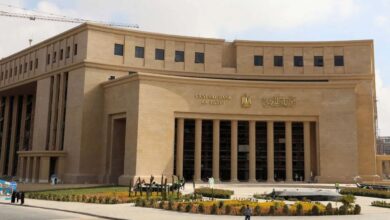Unless serious reforms are made now, the economy could be headed toward a crisis scenario, as more job seekers enter the market and the private sector continues to deteriorate, experts say. The Supreme Council of the Armed Forces (SCAF) has so far shied away from introducing bold measures to instill confidence or ease economic pressures during the transitional period.
“If the economy is not growing by 5 to 7 percent per year, not enough jobs will be created to cater to new entrants into the labor market,” Angus Blair, the head of research at Egyptian investment bank Beltone Financial, said. The Egyptian Center for Economic Studies estimates that 700,000 Egyptians enter the labor market each year.
Economic growth is expected at 1.36 percent in the 2011-2012 financial year and 3.6 percent the next, according to a Reuters survey of 12 leading economists published on 1 October. The Egyptian government is more optimistic, estimating 3.5 percent growth. Inflation is set to remain high at around 10.9 percent next year, according to the Reuters report.
Growth for the 2010-2011 financial year ending in June came in at a meager 1.8 percent, most of which was achieved prior to January when Egypt's economy was growing at an average rate of 6 percent, according to the Central Bank of Egypt.
Economic analysts, political thinkers and senior officials express concern at the failure to implement serious reforms. Many argue that the SCAF’s economic policies have been formed in reaction to public pressure, rather than careful economic planning.
Critics say the transitional government, under the SCAF’s leadership, lacks the vision to address the economic challenges inherited from the previous regime amid prevailing instability since 25 January.
“We’re on the verge of a looming crisis if we don’t undertake serious reforms in this period. The SCAF has so far shown that it is only continuing the policies of the Mubarak regime,” said Ibrahim al-Essawy, a senior researcher at the National Institute of Planning.
The SCAF, which has assumed both the legislative and executive functions of government, has the final say on most economic decisions, while many speculate that ministries currently play a more administrative and consultative role.
“The SCAF interferes in all aspects of governance, but doesn’t have much to offer in terms of economic policy. Their interference, in fact, paralyzes the ability of experts [in the ministries] to do their jobs,” said Hanaa Kheir el-Din, a fellow at the Economic Research Forum, a Cairo-based research center.
Slow to change
The SCAF’s hesitance to implement major reforms, such as changes to fuel and food subsidies and the national minimum wage, has led analysts to conclude that inaction is increasing the chances of a crisis.
Labor protests have increased in recent weeks as many of the social justice demands of the 25 January revolution, including higher wages for public sector employees and more spending on health and education, have yet to be met.
“The budget could have at least continued with plans to implement the proposed increase in the minimum wage and provided a forward-looking plan for economic reform, which might have instilled confidence among workers and investors alike,” Kheir el-Din said.
In June, then-Finance Minister Samir Radwan said a minimum wage of LE700 for the 2011-2012 fiscal year had been set, but with numerous revisions to the budget since then, there is still no minimum wage. Also, many workers and labor activists are calling for it to be set at LE1200.
Some say that simply raising the minimum wage is not enough.
“The minimum wage is being dealt with as an ad hoc measure, and separately from other sectors. The demand for a minimum wage is legitimate, but it needs to be taken within the larger context of labor market reforms and increasing labor productivity,” said Ashraf Swelam, former director of Egypt’s International Economic Forum.
The lack of effective communication by the government on economic policy, explaining why certain decisions are made, has also frustrated many. There is a sense that policies are reactive rather than forward-looking.
“The cloudy policy environment does not give investors confidence to make new investments when the direction of policies remains so uncertain,” Swelam said. Essawy pointed out that Egypt should not expect long-term policies from a transitional government. But the SCAF could have restructured subsidies to alleviate the government’s fiscal burden.
According to a 2009 study by Kheir el-Din, petroleum subsidies mainly benefit the rich. “These could easily have been restructured in the transitional phase to ease the budget deficit,” she said.
A July 2011 study by the Carnegie Endowment for International Peace also concluded that restructuring and reducing fuel subsidies could constitute an immediate short-term solution for many of Egypt’s fiscal problems, as they represent more than 20 percent of total government expenditures.
Many of the fuel subsidies go toward energy-intensive industries, such as cement, steel and iron producers, and benefit the middle classes rather than directly targeting the poor.
Low investor confidence
The uncertain political climate and poor security environment since 25 January has led to a loss in investor confidence and capital flight. Foreign direct investment fell by 67.6 percent to US$2.2 billion, from US$6.8 billion during the 2010-2011 fiscal year, according to Central Bank figures. Egypt’s 2010-2011 balance of payments deficit stands at US$9.2 billion.
Nevertheless, Central Bank of Egypt Governor Farouk al-Oqdah saw a silver-lining. During the 2008 financial crisis, both short-term and long-term investors left Egypt, he said, “but [only] the short-term investor left from February to June, while long-term investors didn’t liquidate their positions. It’s not a large [amount of capital], but it is a vote of confidence,” he said.
Petroleum investors – whose outlook is long-term – have maintained their positions. British Petroleum and British Gas, two of the largest foreign investors in Egypt, have even committed to new investment. But outside of petroleum, new investment is slow.
Part of the problem is the uncertain climate around legislation, and the decision to revisit privatization contracts signed under the former regime. Many previous deals were considered corrupt and a waste of public funds.
A recent government report said that the privatization of 11 public sector companies under Mubarak effectively squandered LE7 billion. New investors will, however, be hesitant to enter contracts until clearer legislation and policies on business deals are in place, many analysts have said.
The pushback against the Mubarak regime’s privatization drive may have its origins in the military’s own economic interests.
According to a September 2008 US Embassy cable released by the whistleblower website WikiLeaks, the military – then headed by Field Marshal Hussein Tantawi, who is now chairman of the SCAF – never supported the government’s privatization program.
“Most analysts agreed that the military views the GOE’s [government of Egypt’s] privatization efforts as a threat to its [the military’s] economic position, and therefore generally opposes economic reforms,” the document said.
Budget’s missed opportunity
Some have expressed disappointment with the decision not to implement a more expansionary fiscal policy by significantly increasing government spending in the current budget.
The military council has instead committed, along with the Central Bank and Ministry of Finance, to a fiscal consolidation program to reduce the budget deficit, which stands at 8.6 percent of GDP for this year’s budget. Starting June 2012, the deficit will be reduced by 1 to 1.5 percent every year until it reaches a figure of 4 percent in the next three to four years.
“The government could have ignited domestic demand by injecting capital into key employment sectors such as construction and tourism,” Swelam said. “This would have sent a positive signal to investors,” he added.
In June, the SCAF rejected an expansionary budget that was based on receiving US$3 billion of loans from the World Bank and International Monetary Fund after then-Finance Minister Samir Radwan revealed the package following banks' approval.
Despite widespread speculation as to the political reasons for rejecting the loan, some suggested it is further evidence that the SCAF intends to toe the line of Mubarak-era policies.
The decision to curb reliance on foreign loans and borrow domestically was made before the January uprisings, said Magda Kandil, executive director of the Egyptian Center for Economic Studies. "It is an expensive strategy and has a big toll on private sector activity,” she added.
The government’s decision to fund the deficit by borrowing from domestic banks has raised fears among some analysts that it will come at the expense of private sector lending, as the private sector would have to compete for a more limited pool of domestic funding.
Kandil would like to see the government looking more closely at concessional lending from international and regional donors to ease budget constraints. But, she said, most international support is in project lending and won’t address the fiscal shortfall. Moreover, international donors may be reluctant to lend because they complain “about the lack of an action or business plan from the government to target specific projects,” she said.
The role of the state
Some analysts and activists attribute Egypt’s economic hardships in large part to the Mubarak government’s neo-liberal policies, which diminished the state’s role in the economy. National industries were privatized and public land was sold to private investors.
Much of the criticism is directed at the fact that these policies, while contributing to high levels of GDP growth, did little for issues like unemployment and wages. Meanwhile, many of the economic reforms were marred by crony capitalism and corruption, particularly in privatization deals, which helped bolster the position of Mubarak’s son, Gamal Mubarak, and his business allies.
The Mubarak regime justified its hands-off approach to the economy by lauding the high rates of GDP growth over the past five years, when many of these policies took form. However, Essawy claims that the regime's policies led to a shambolic and lopsided economy that came at the expense of social justice and the country’s ability to sustain itself.
”We need a specific plan that aims at self-sustainability, developing human resources, and a greater role for the state in shepherding the development of the economy. The focus on mere growth figures – which were usually inflated – never addressed the fundamentals in the Egyptian economy, which were actually deteriorating,” Essawy said.




